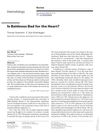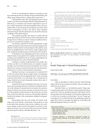 January 2023 in “Research Square (Research Square)”
January 2023 in “Research Square (Research Square)” Hair cortisol may be a good indicator of recent mood in people with bipolar disorder.
 64 citations,
February 1995 in “Journal of The American Academy of Dermatology”
64 citations,
February 1995 in “Journal of The American Academy of Dermatology” Lithium therapy may cause skin problems like hidradenitis suppurativa and other side effects, which can improve after stopping the medication.
 48 citations,
May 2012 in “Journal of Midwifery & Women's Health”
48 citations,
May 2012 in “Journal of Midwifery & Women's Health” Polycystic Ovary Syndrome is common but often undiagnosed, and early treatment is important to prevent health problems.
 47 citations,
January 2003 in “American Journal of Clinical Dermatology”
47 citations,
January 2003 in “American Journal of Clinical Dermatology” Mood stabilizers can cause serious skin reactions; careful monitoring and immediate treatment are crucial.
 41 citations,
October 2012 in “Australian and New Zealand Journal of Psychiatry”
41 citations,
October 2012 in “Australian and New Zealand Journal of Psychiatry” Negative expectations can cause adverse effects in patients even without active treatment, and managing this nocebo effect involves better communication and patient-clinician relationships.
 11 citations,
September 2021 in “Journal of molecular endocrinology”
11 citations,
September 2021 in “Journal of molecular endocrinology” ERβ has potential in treating prostate cancer and neurodegenerative diseases, but human studies are needed before clinical use.
 11 citations,
August 2014 in “Current Urology Reports”
11 citations,
August 2014 in “Current Urology Reports” Medications for enlarged prostate can cause sexual side effects like reduced libido, erectile dysfunction, and ejaculatory problems.
 10 citations,
January 2005 in “Dermatology”
10 citations,
January 2005 in “Dermatology” Baldness may be linked to heart disease, but the evidence isn't strong enough to consider it a major risk factor.
 10 citations,
December 2002 in “International Journal of Dermatology”
10 citations,
December 2002 in “International Journal of Dermatology” Cyproterone acetate can cause rare shortness of breath in women.
 7 citations,
January 2019 in “Brazilian Journal of Pharmaceutical Sciences”
7 citations,
January 2019 in “Brazilian Journal of Pharmaceutical Sciences” Maidenhair fern extract reduced anxiety and depression in rats and may work due to its antioxidant and anti-inflammatory properties.
 1 citations,
December 2017 in “Anais Brasileiros de Dermatologia”
1 citations,
December 2017 in “Anais Brasileiros de Dermatologia” Frontal fibrosing alopecia can mimic traction alopecia but has distinct features like facial papules and eyebrow thinning.
 1 citations,
January 2014 in “Progress in Neurology and Psychiatry”
1 citations,
January 2014 in “Progress in Neurology and Psychiatry” Skin diseases can cause psychological issues, and better integration of dermatology and psychiatry is needed to improve patient care.
 October 2023 in “Cognizance journal”
October 2023 in “Cognizance journal” The document suggests using natural remedies like bloodletting and honey for various health issues but lacks scientific evidence for their effectiveness.
 January 2018 in “Deleted Journal”
January 2018 in “Deleted Journal” Managing PCOS effectively requires focusing on psychological health, lifestyle changes, and medication.
 November 2003 in “Journal of Dermatology”
November 2003 in “Journal of Dermatology” Authors defend finasteride-depression link, suggest detailed medical history, and call for more investigation.
 162 citations,
August 2004 in “Journal of Investigative Dermatology”
162 citations,
August 2004 in “Journal of Investigative Dermatology” Hair loss causes stress and affects mental health; treatment and support needed.
 109 citations,
January 2011 in “Frontiers in Systems Neuroscience”
109 citations,
January 2011 in “Frontiers in Systems Neuroscience” Choosing the right model order in brain connectivity analysis can affect the detection of differences between healthy individuals and those with seasonal affective disorder.
 88 citations,
October 2002 in “Journal of Dermatology”
88 citations,
October 2002 in “Journal of Dermatology” Finasteride for hair loss may cause depression, affecting sleep and relationships.

research Acne
58 citations,
January 1997 in “Dermatologic Clinics” Acne significantly affects mental health and quality of life, with research suggesting hormonal and genetic factors in its development and emphasizing early treatment to prevent scarring.
 46 citations,
September 2003 in “International Journal of Dermatology”
46 citations,
September 2003 in “International Journal of Dermatology” Trichodynia found in 29% of TE or AGA patients, linked to psychological conditions.
 42 citations,
September 2018 in “Journal der Deutschen Dermatologischen Gesellschaft”
42 citations,
September 2018 in “Journal der Deutschen Dermatologischen Gesellschaft” Adult female acne requires a comprehensive treatment approach, including medical options and lifestyle changes, with attention to psychological well-being.
 31 citations,
October 2013 in “Psychosomatics”
31 citations,
October 2013 in “Psychosomatics” Psychotropic medications can cause skin reactions, including severe conditions like SJS and TEN, and it's important for psychiatrists to recognize and manage these side effects.
 30 citations,
March 2001 in “Environmental Health Perspectives”
30 citations,
March 2001 in “Environmental Health Perspectives” Small changes in hormones can significantly impact health, showing the importance of sensitive testing for chemicals that disrupt hormones.
 26 citations,
February 2002 in “Urologic clinics of North America”
26 citations,
February 2002 in “Urologic clinics of North America” The document concludes that it's important to understand the placebo effect when evaluating the effectiveness of treatments in medical trials.
 21 citations,
October 2011 in “British Journal of Dermatology”
21 citations,
October 2011 in “British Journal of Dermatology” Testosterone therapy helped 63% of androgen-deficient women grow scalp hair, but more research is needed.
 19 citations,
May 2021 in “Clinical epidemiology and global health”
19 citations,
May 2021 in “Clinical epidemiology and global health” Better awareness of chemotherapy's side effects improves self-care.
 19 citations,
January 2013 in “Journal of Cutaneous Medicine and Surgery”
19 citations,
January 2013 in “Journal of Cutaneous Medicine and Surgery” Alopecia patients struggle with emotions and stress, and improving emotional intelligence may help manage hair loss.
 18 citations,
March 2019 in “Journal of The European Academy of Dermatology and Venereology”
18 citations,
March 2019 in “Journal of The European Academy of Dermatology and Venereology” Finasteride use doesn't cause sexual dysfunction in men with hair loss.
 16 citations,
January 2019 in “Kansas journal of medicine”
16 citations,
January 2019 in “Kansas journal of medicine” Healthcare providers need better education and policies to serve transgender individuals effectively.
 16 citations,
January 2019 in “Neuropsychobiology”
16 citations,
January 2019 in “Neuropsychobiology” People with Lichen Planopilaris tend to be more depressed, have lower self-esteem, and a worse quality of life.






























